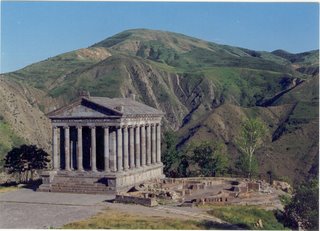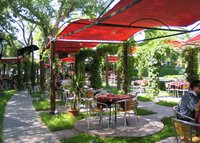The 501s
Tucked underneath a vaguely French-style deli is Pub 501, Novosibirsk's only cowboy bar. A creaky set of wooden steps, illuminated by the orange glow of incandescent lamps in brass fixtures, opens into a room with nearly a dozen oak tables placed on the right side and a long lacquered mahogany bar on the left. Paraphernalia of the American West dot the ceilings and walls. A portrait of Annie Oakley, arrow-pierced hats, boots, steer horns, Colt 45s and, of course, the obligatory tomahawk and bow-and-arrow. The piped-in mishmash soundrack alternates between 70s AM radio and early 1950s crooners.
Accompanied by Garreth, an English mechanical engineer I had met in the hotel's dilapidated Internet Centre, we struggled in vain to find any open stool, the place already packed at 9 pm. As we conversed in English nearly every head turned, locals undoubtedly playing Spot-The-Foreigner. Despite being Russia's third largest city and unofficial capital of Siberia, not many tourists swing through Novosibirsk and even fewer presumably drop into the 501.
Every Friday and Saturday night, the four-piece house band, named the 501s, takes the three-person stage. The opening electric guitar riff of "Hotel California" reverbed through the pub as the drummer, who played an amazing synthetic drumset, pounded out the beat. There's something quite special about non-English speaking singers belting out Western hits and it was gratifiying to secretly laugh at Russians for a change for mispronouncing our words. The setlist was exquisitely bad, yet somehow brilliant: Genesis' "Turn it On", Michael Jackson's "Beat It", The Looking Glass' "Brandy, You're a Fine Girl", and easily the highlight of the evening, "Ghostbusters Theme". As the band rocked it hard all night, Garreth and I let out a variety of whistles and whoops and, with index and pinky fingers extended, the heavy metal sign was used liberally. The keyboardist, decked out in an Iron Maiden T-shirt, was appreciative, to say the least.
The Baltika-fueled hangover this morning was not nearly as fun.





